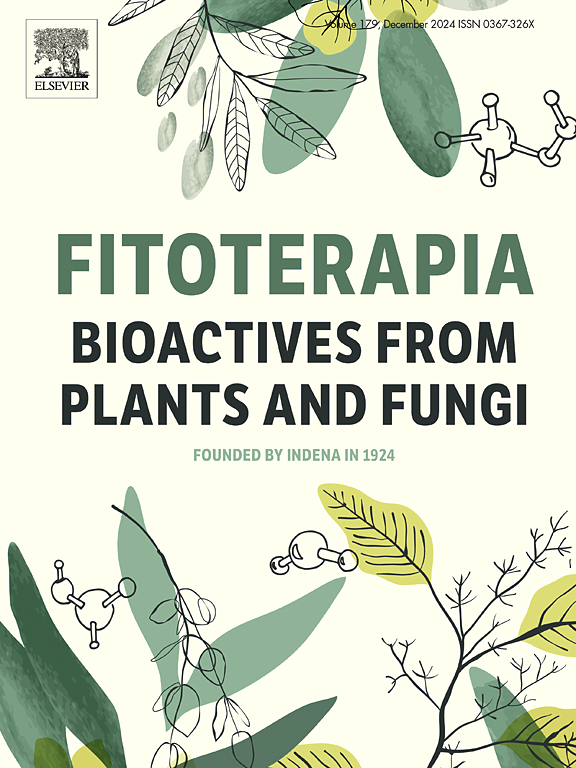IF 2.5
3区 医学
Q3 CHEMISTRY, MEDICINAL
引用次数: 0
摘要
银桥止痒方(YQAF)是湖州市中医院长期临床使用的治疗特应性皮炎(AD)的中药方剂。该方疗效确切,毒副作用小。然而,YQAF 治疗特应性皮炎的具体机制仍不明确。我们在2,4-二硝基氯苯(DNCB)诱导的AD小鼠模型中证实了YQAF对Th2型炎症的治疗作用,并阐明了其潜在机制。结果表明,YQAF能有效改善AD样皮肤损伤。YQAF抑制了DNCB诱导的表皮增生异常增厚,减少了肥大细胞浸润和皮损处胶原纤维数量,降低了肿瘤坏死因子-α(TNF-α)、胸腺基质淋巴细胞生成素(TSLP)、白细胞介素(IL)-6和核因子卡巴B(NF-κB)的表达。YQAF抑制了Th2型免疫反应,降低了Th2细胞在dLNs中的百分比,减少了第2组先天性淋巴细胞(ILC2)的浸润,并抑制了皮损中IL-4和IL-13的表达。根据转录组测序结果,YQAF抑制了细胞因子-细胞因子相互作用途径。我们的研究结果表明,YQAF能改善DNCB诱导的AD样皮损症状,这可能与抑制细胞因子-细胞因子相互作用通路有关。这表明YQAF具有作为传统中药配方治疗AD的潜力。本文章由计算机程序翻译,如有差异,请以英文原文为准。

Yinqiao antipruritic formula attenuates atopic dermatitis-like skin lesions through modulating the cytokine-cytokine receptor interaction pathway
Yinqiao Antipruritic Formula (YQAF) is a traditional Chinese medicine (TCM) formula for treating atopic dermatitis (AD) that has been used by the Huzhou Traditional Chinese Medicine Hospital in long-term clinical practice. It has definite therapeutic effects and minimal toxic side effects. However, the specific mechanism underlying the therapeutic effects of YQAF on AD remains ambiguous. We demonstrated the therapeutic effect of YQAF on Th2 type inflammation in a 2,4-dinitrochlorobenzene (DNCB)-induced AD mice model and elucidated the underlying mechanism. Results showed that YQAF effectively ameliorated the AD-like skin damage. YQAF suppressed the abnormal thickening of the epidermal hyperplasia induced by DNCB, decreased the mast cells infiltration, the collagen fibres number in the skin lesions, and reduced the expression of tumor necrosis factor-α (TNF-α), thymic stromal lymphopoietin (TSLP), interleukin (IL)-6 and nuclear factor kappa B (NF-κB). YQAF inhibited the Th2-type immune response, decreased the percentages of Th2 cells in dLNs, reduced the infiltration of group 2 innate lymphoid cells (ILC2), and suppressed the expression of IL-4 and IL-13 in skin lesions. According to the transcriptome sequencing results, YQAF inhibited the cytokine-cytokine interaction pathways. Our findings indicated that YQAF improved the symptoms of DNCB-induced AD-like lesions, which may be related to the inhibition of cytokine-cytokine interaction pathways. This indicated the potential of YQAF as a traditional Chinese Medicine formula for the treatment of AD.
求助全文
通过发布文献求助,成功后即可免费获取论文全文。
去求助
来源期刊

Fitoterapia
医学-药学
CiteScore
5.80
自引率
2.90%
发文量
198
审稿时长
1.5 months
期刊介绍:
Fitoterapia is a Journal dedicated to medicinal plants and to bioactive natural products of plant origin. It publishes original contributions in seven major areas:
1. Characterization of active ingredients of medicinal plants
2. Development of standardization method for bioactive plant extracts and natural products
3. Identification of bioactivity in plant extracts
4. Identification of targets and mechanism of activity of plant extracts
5. Production and genomic characterization of medicinal plants biomass
6. Chemistry and biochemistry of bioactive natural products of plant origin
7. Critical reviews of the historical, clinical and legal status of medicinal plants, and accounts on topical issues.
 求助内容:
求助内容: 应助结果提醒方式:
应助结果提醒方式:


